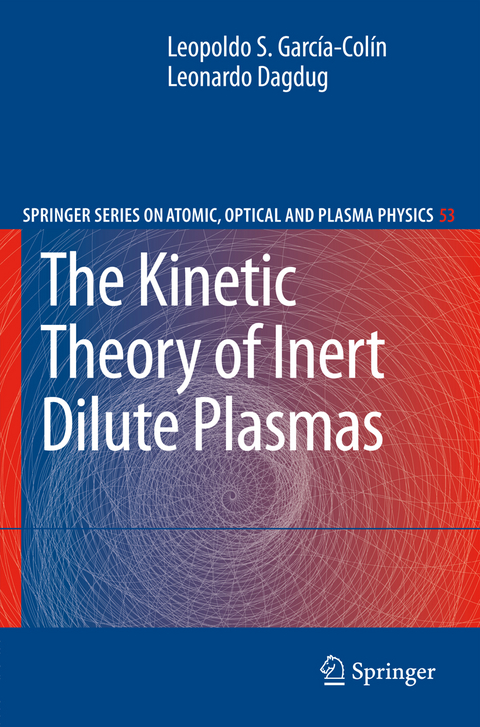
The Kinetic Theory of Inert Dilute Plasmas
Seiten
2010
|
Softcover reprint of hardcover 1st ed. 2009
Springer (Verlag)
978-90-481-8109-4 (ISBN)
Springer (Verlag)
978-90-481-8109-4 (ISBN)
This book constructs all the transport properties of the system within the framework of linear irreversible thermodynamics. This includes a systematic study of all possible cross effects as well as the famous H-theorem.
The contents of this book are the result of work performed in the past three years to provide some answers to questions raised by several colleagues wo- inginastrophysics. Examiningseveraltransportprocessesinplasmasrelated to dissipative e?ects in phenomena such as cooling ?ows, propagation of sound waves, thermal conduction in the presence of magnetic ?elds, an- lar momentum transfer in accretion disks, among many, one ?nds a rather common pattern. Indeed when values for transport coe?cients are required the overwhelming majority of authors refer to the classical results obtained by L. Spitzer and S. Braginski over forty years ago. Further, it is also often mentioned that under the prescribed working conditions the values of such coe?cients are usually insu?cient to provide agreement with observations. The methodology followed by these authors is based upon Landau's - oneering idea that collisions in plasmas may be substantially accounted for when viewed as a di?usive process. Consequently the ensuing basic kinetic equation is the Fokker-Planck version of Boltzmann's equation as essentially proposed by Landau himself nearly 70 years ago. Curiously enough the magni?cent work of the late R.
Balescu in both Classical and Non-Classical transport in plasmas published in 1988 and also based on the Fokker-Planck equation is hardly known in the astrophysical audience. The previous work of Spitzer and Braginski is analyzed with much more rigorous vision in his two books on the subject.
The contents of this book are the result of work performed in the past three years to provide some answers to questions raised by several colleagues wo- inginastrophysics. Examiningseveraltransportprocessesinplasmasrelated to dissipative e?ects in phenomena such as cooling ?ows, propagation of sound waves, thermal conduction in the presence of magnetic ?elds, an- lar momentum transfer in accretion disks, among many, one ?nds a rather common pattern. Indeed when values for transport coe?cients are required the overwhelming majority of authors refer to the classical results obtained by L. Spitzer and S. Braginski over forty years ago. Further, it is also often mentioned that under the prescribed working conditions the values of such coe?cients are usually insu?cient to provide agreement with observations. The methodology followed by these authors is based upon Landau's - oneering idea that collisions in plasmas may be substantially accounted for when viewed as a di?usive process. Consequently the ensuing basic kinetic equation is the Fokker-Planck version of Boltzmann's equation as essentially proposed by Landau himself nearly 70 years ago. Curiously enough the magni?cent work of the late R.
Balescu in both Classical and Non-Classical transport in plasmas published in 1988 and also based on the Fokker-Planck equation is hardly known in the astrophysical audience. The previous work of Spitzer and Braginski is analyzed with much more rigorous vision in his two books on the subject.
1 Non-equilibrium Thermodynamics.- 2 The Problem. 2.1 Conservation Equations. 2.2 The H Theorem and Local Equilibrium.- 3 Solution of the Boltzmann Equation.- 4 Calculation of the Currents. 4.1 Diffusion Effects. 4.2 Flow of Heat.- 5 Solution of the Integral Equations.- 6 The Transport Coefficients.- 7 Discussion of the Results.- 8 Viscomagnetism. 8.1 The Integral Equation. 8.2 The Stress Tensor. 8.3 The Integral Equation. 8.4 Comparison with Thermodynamics.- 9 Magnetohydrodynamics.- A Calculation of M. B Linearized Boltzmann Collision Kernels. C The case when = 0. D The collision integrals. E Calculation of the coefficients. F Appendix F. G Appendix G. H Appendix H. I List of Marshall s equations and notation. I.1 Equations. I.2 Notation.
| Erscheint lt. Verlag | 19.10.2010 |
|---|---|
| Reihe/Serie | Springer Series on Atomic, Optical, and Plasma Physics ; 53 |
| Zusatzinfo | VIII, 166 p. |
| Verlagsort | Dordrecht |
| Sprache | englisch |
| Maße | 155 x 235 mm |
| Themenwelt | Naturwissenschaften ► Physik / Astronomie ► Astronomie / Astrophysik |
| Naturwissenschaften ► Physik / Astronomie ► Atom- / Kern- / Molekularphysik | |
| Naturwissenschaften ► Physik / Astronomie ► Plasmaphysik | |
| Naturwissenschaften ► Physik / Astronomie ► Thermodynamik | |
| ISBN-10 | 90-481-8109-7 / 9048181097 |
| ISBN-13 | 978-90-481-8109-4 / 9789048181094 |
| Zustand | Neuware |
| Haben Sie eine Frage zum Produkt? |
Mehr entdecken
aus dem Bereich
aus dem Bereich
Grundlagen, Anwendungen in Astrophysik und Kosmologie sowie …
Buch | Softcover (2022)
Springer Spektrum (Verlag)
CHF 69,95
die Geschichte und Erforschung unserer Galaxie
Buch | Hardcover (2023)
C.Bertelsmann (Verlag)
CHF 40,80
Von Hubble-, James-Webb- und anderen Großteleskopen bis zu …
Buch | Softcover (2024)
Springer (Verlag)
CHF 32,15


